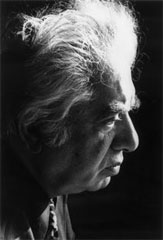
Khachaturian 2003
Distributed by Seventh Art Releasing, 7551 Sunset Blvd., Suite 104, Los Angeles, CA 90046; 323-845-1455
Produced by Peter Rosen
Directed by Peter Rosen
VHS, color and b&, 83 min.
Sr. High - Adult
Music, Biography, Soviet Union
Date Entered: 10/20/2004
Reviewed by Bonnie Jo Dopp, Performing Arts Library, University of MarylandArmenian-Georgian composer Aram Khachaturian (1903-1978) lived during Russia’s Soviet years, and his career mirrored the political events of his day. Early ‘revolutionary’ experimentation gave way to strict ‘Soviet realism’ after he was denounced for being a ‘formalist’ in 1948. Though he had used Armenian sources in his music before then, he was sent back to Armenia ‘as a punishment’ to refresh his roots and his music became even more infused with the ‘oriental’ flavors of Armenian music. Over the years, Khachaturian gained in stature, to the point of being declared a ‘Hero of Socialist Labor’ in 1973.
Using copious documentary footage from Russia, this film reveals just how awful being accused of doing the wrong thing was for artists and composers in the Stalin years (the government filmed their responses to its repressive actions – preserving shocked expressions on the faces of, for example, Prokofiev, Shostakovich, and Khachaturian for the ages). Filmmakers accompanied Khachaturian on his travels ‘home’ too, and reported on his every move. Using autobiographical writings, the scriptwriters Bill Van Horn and Solomon Volkov give actor Eric Bogosian, speaking as Khachaturian, quite a story to tell: how to survive as an artist in an authoritarian state. As part of the solution, the composer wrapped himself in ‘folk music’ – using ethnic scales, rhythms, and sometimes tunes in his film scores and art music. People who knew Khachaturian also speak: Mstislav Rostrpovich, Tikhon Khrenikov (the composer who read the government’s denunciation statement in 1948 and had sense enough in the end to admit that was “the biggest mistake of my life”), Khachaturian’s nephew Karen, and others. Some contemporary filmed performances are included: David Oistrakh on violin, Rostrpovich on cello, bits of the ballet Gayaneh (including the famous “Sabre Dance”) and fabulous long scenes from the ballet Spartacus.
A generous amount of Khachaturian’s music is superbly performed anew for this film, by the Armenian Philharmonic Orchestra, conducted by Loris Tjeknavorian.
Students of Soviet Russia, 20th-century music, and the influence of ethnic music on art music would profit from exposure to this film. For now, questions remain concerning how cooperative and/or subversive Soviet artists and composers were. This film does not provide definite answers about Khachaturian, but may provoke questions for scholarship to ponder, surely a service to academe.
Awards
- Best Doc, 2003 Hollywood Film Festival